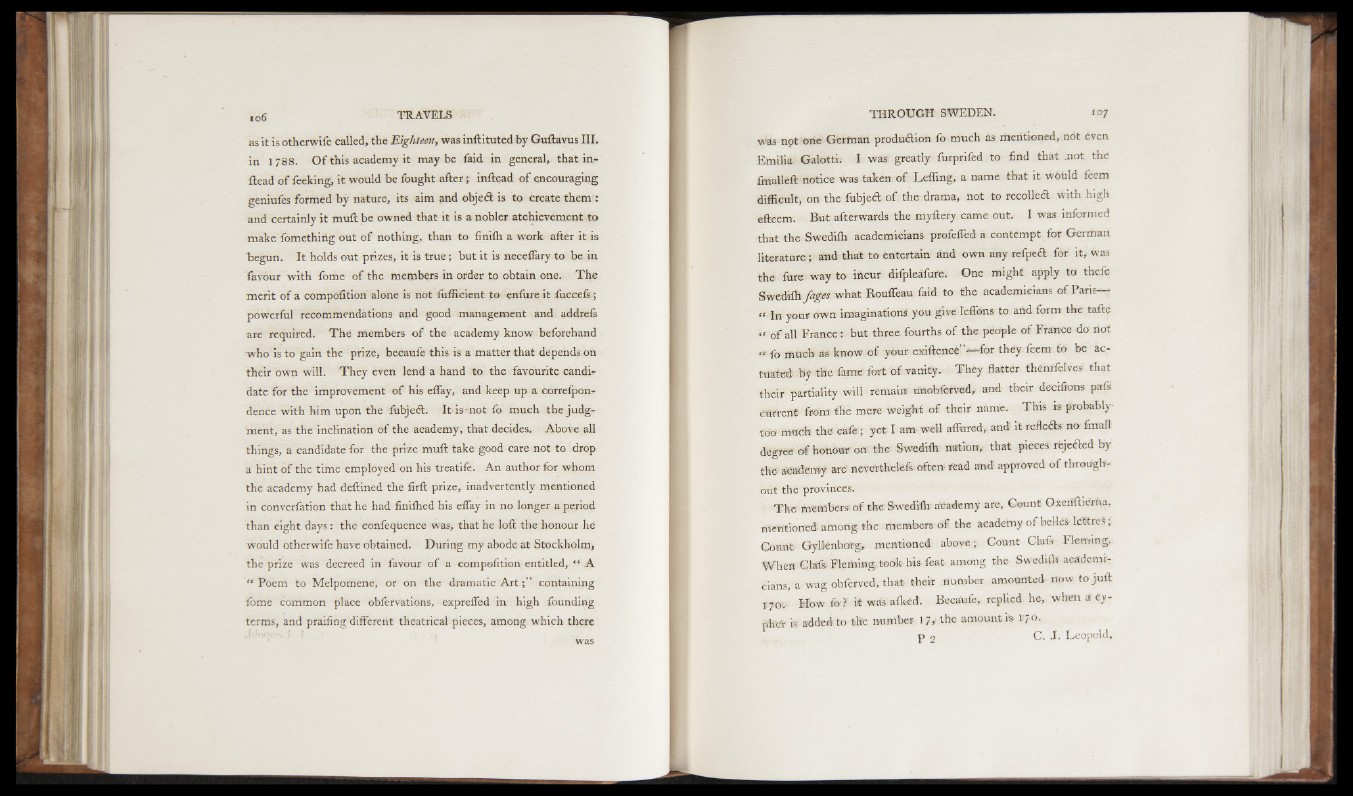
as it is otherwife called, the Eighteen, was inftituted by Guftavus III.
in 1788. O f this academy it ma ybe faid in general, that in-
ftead o f feeking, it would be fought after; inftead o f encouraging
geniufes formed by nature, its aim and objed is to create them :
and certainly it muft be owned that it is a nobler atchievement to
make fomethirig out o f nothing, than to finiih a work after it is
begun. It holds out prizes, it is tru e ; but it is neceflary to be in
favour with fome o f the members in order to obtain one. T he
merit o f a compoiition alone is not iufHcient to eniure it fucceis;
powerful recommendations and good management and addrefs
are required. T h e members o f the academy know beforehand
who is to gain the prize, becaufe this is a matter that depends on
their own will. They even lend a hand to the favourite candidate
for the improvement o f his eflay, and keep up a correfpon-
dence with him upon the fubjed. It is-not fo much the judgment,
as the inclination o f the academy, that decides. Above all
things, a candidate for the prize muft: take good care not to drop
a hint o f the time employed on his treatife. An author for whom
the academy had deftined the firft prize, inadvertently mentioned
in converfation that he had finilhed his eflay in no longer a period
than eight days: the eonfequence was, that he loft; the honour he
would otherwife have obtained. During my abode at Stockholm,
the prize was decreed in favour o f a compoiition entitled, “ A
" Poem to Melpomene, or on the dramatic A r t c o n t a in in g
lome common place obfervations, exprefled in high founding
terms, and praifing different theatrical pieces, among which there
was
was npt one German produdion fo much as mentioned, not even
Emilia Galotti. I was greatly furprifed to find that .not the
fmalleft notice was taken o f Lefling, a name that it wbuld feem
difficult, on the fubjed o f the drama, not to recoiled With high
efteem. But afterwards the myftery came out. I was informed
that the Swedilh academicians profefled a contempt for German
literature; and that to entertain and own any refped for it, was
the lure way to incur difpleafure. One might apply to thefe
S wedilh fages what Rouffeau faid to the academicians o f Paris—
“ In your own imaginations you give leflons to and form the tafte
“ o f all France: but three fourths of the people o f France do not
“ • fo much as know o f your exiftencfi”— for they feem fo be actuated
by the lame fort o f vanity. They flatter themlclvcs that
their partiality will remain Unobforved; and their decifrons pafs
cUffent- ftom the mere weight o f their name. This is probably
too mush the' cafe ; yet I am well allured, and' it refleds no fmall
degree o f honour on the Swedilh nation, that pieces rejeded by
the. academy are neveitheltefs often read and approved o f throughout
the provinces.
T h e members o f foe Swedilh academy are, Count Oxenftierna,
mentioned, among the members o f foe academy o f bellet le ttre l;
Count Gylfenborg, mentioned above; Count Claf» Fleming.
When Cldfa Fleming, took-his feat among the Swedilh academicians,
a wag obferved, that their number amounted now to juft
1 7CM, H ow fo ? it was afked. Becaufe, replied he, when a cy pher
is added to foe number 17,’ the amount is- 1-70.
p 2 C . J. Leopold,